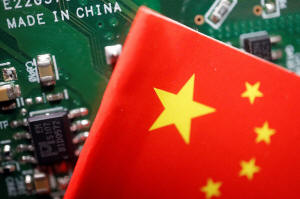At major China chip fair, firms ramp up call to buy domestic
 Send a link to a friend
Send a link to a friend
 [March 22, 2024] SHANGHAI
(Reuters) - Chinese semiconductor-related companies pulled out all the
stops at one of the country's largest chip-sector fairs this week to
pitch domestic buying, echoing Beijing's call to galvanize support for
an industry facing growing geopolitical strains. [March 22, 2024] SHANGHAI
(Reuters) - Chinese semiconductor-related companies pulled out all the
stops at one of the country's largest chip-sector fairs this week to
pitch domestic buying, echoing Beijing's call to galvanize support for
an industry facing growing geopolitical strains.
The message was plastered across booths and marketing materials of a
variety of companies, from chip equipment makers to materials producers.
These included Vel-Tec Semiconductor, a Kunshan-based firm that makes
photoresist coating equipment, and Shenzhen-listed Jingsheng, which
manufactures machines used for processing silicon wafers.
Over a dozen Chinese exhibitors at the annual SEMICON China show in
Shanghai that Reuters spoke to said their products could be used as
replacement for foreign-made ones. Staff from foreign firms that were
represented said that while there was still a gap in quality and
efficacy, Chinese rivals were quickly catching up.
"'Buy local' and getting supply chains out of US control was a clear
focus of many at the show," said Cameron Johnson, a Shanghai-based
senior partner at consultancy Tidalwave Solutions, who has attended
SEMICON since 2016.
The three-day show provided a glimpse into the mood of the Chinese
semiconductor industry, which has been hit with multiple export curbs
from the U.S. and its allies. Washington says it does not want to see
advanced chips and related technology end up in the hands of the Chinese
military.
Such pressure has spurred calls from Beijing to its domestic chip
industry to catch up faster with foreign countries and to become more
self-reliant. China has poured billions of dollars into the effort but
the complexities and globally interconnected nature of the chip supply
chain has meant that a big gap still exists, analysts say.
Few U.S. firms turned up at the event that attracted 1,100 exhibitors
and large crowds of visitors though there were several Japanese, South
Korean, and Taiwanese companies. Big Chinese names such as the country's
largest foundry, SMIC, were also absent.

[to top of second column] |

A Chinese flag is displayed next to a "Made in China" sign seen on a
printed circuit board with semiconductor chips, in this illustration
picture taken February 17, 2023. REUTERS/Florence
Lo/Illustration/File photo

CATCHING UP
A Beijing-based salesperson, surnamed Ye, representing a Japanese
company that makes materials used in chipmaking, said Chinese rivals
are rapidly closing the gap in material areas that do not require
cutting-edge technology.
"Formulating material prescriptions is a major entry barrier, but
Chinese companies are learning quickly and overcoming this hurdle,"
he said.
This is because more manufacturing facilities are willing to use
materials prescribed by Chinese firms, a trend that has certainly
been accelerated by U.S. sanctions, he said.
Chinese companies are also gaining more orders against foreign
rivals in the equipment sector, according to Ye, who said he deals
with many Chinese semiconductor equipment makers.
An attending salesperson from a Shenzhen-based firm that makes
testing equipment used throughout all processes of chipmaking said
Chinese firms had cost advantages and his firm's highest-end product
is now being sold at just one-third of the price of its Japanese
rivals.
Because of the cost advantage, manufacturing facilities and clients
tend to prioritize domestic firms for production lines in newly
opened plants, he said, asking not to be named as he has been told
not to speak to media.
In some cases, they even replace foreign equipment with domestic
alternatives in older production lines, he added.
(Reporting by Brenda Goh and Yelin Mo; Editing by Muralikumar
Anantharaman)
[© 2024 Thomson Reuters. All rights
reserved.]
This material may not be published,
broadcast, rewritten or redistributed.
Thompson Reuters is solely responsible for this content. |